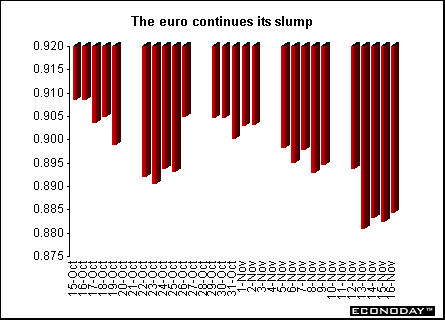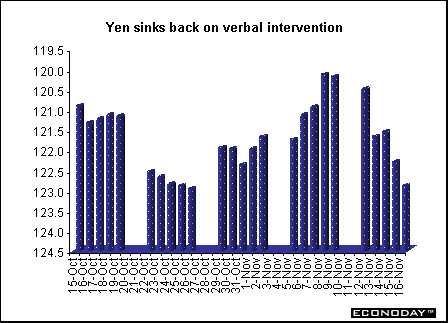
Currencies
The dollar rose on favorable war news Tuesday and climbed to 87.92 cents per euro - its highest level since August 8. Comments from U.S. investigators suggesting terrorists played no role in Monday's crash also bolstered the dollar.

Some investors continue to bet that the United States will be the first major economy to recover from the global economic slump, particularly if the threat of further terrorist attacks recedes. The euro slipped after a report showed France's inflation rate unexpectedly increased last month, which may deter the European Central Bank from cutting interest rates a fifth time this year in an effort to stimulate sagging growth. Analysts continue to be surprised that the euro did not rise after the ECB cut interest rates by 50 basis points when they last met on November 8.
The euro was helped Friday when German Chancellor Gerhard Schroeder won a confidence vote in parliament, approving the use of troops to support the United States in Afghanistan and avoiding the collapse of his coalition government.
The dollar also rose against the yen after U.S. backed forces entered Kabul and the Taliban fled the Afghan capital. The dollar was boosted against the yen after officials at Japan's Ministry of Finance signaled the Bank of Japan might sell its currency to shore up the profits of exporters, which count for about 10 percent of the nation's economy. Government officials said that too much appreciation of the yen is unfavorable and that Japan will take action if necessary. Finance Minister Masajuro Shiokawa backed this up and suggested that the government might sell the currency in order to lower its value against the dollar and euro. Verbal intervention is a favorite tool of the government to control the yen's value.

The British pound and the U.S. dollar may get a boost when changes to Morgan Stanley Capital International Inc.'s global stock indexes take place on November 30, increasing demand for British and U.S. stocks. MSCI is shuffling the indexes used as a performance benchmark by about $3 trillion in funds to include companies based on their shares available for trading instead of their full market value. That has increased the weighting of British and U.S. companies, while decreasing that of European and Japanese stocks. While the changes have been known since May and many fund managers have already made adjustments, some funds that try to mirror the index exactly still need to do some fine tuning. Trading near the end of the month by these so-called index or passive funds may boost the pound and dollar against the euro and yen. Most index fund managers will center their trading around November 30, because they won't want to take too much risk of not successfully tracking the index.
 |


Introduction • Global Stock Market Indexes • Recap of Global Markets • Currencies • Indicator Scoreboard

The Bottom Line • Looking Ahead
|